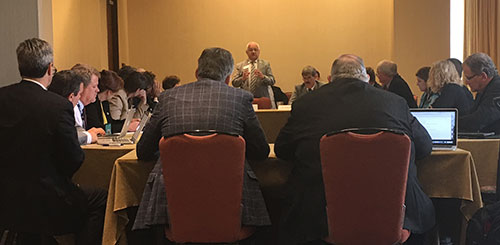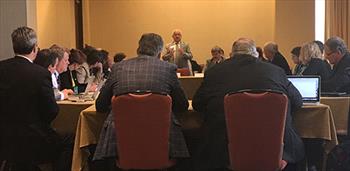

VIN News Service photo
AVMA delegates are assigned to one of seven reference committees, each charged with advising the full House on key initiatives. Divided among this year's reference committees are eight resolutions, two bylaws amendments and several weighty forum topics. Former AVMA President Dr. Joe Kinnarney (above) addressed a reference committee during last summer's meeting in San Antonio.
Telemedicine is expected to headline next week's meeting of American Veterinary Medical Association policymakers.
The AVMA House of Delegates will gather July 20-21 in Indianapolis to debate a slew of amendments and resolutions, two of which pertain to veterinary medicine's role in the evolving and expanding landscape of remote health care. Other topics on the House agenda range from marijuana therapies and prescription monitoring to service animals and the use of veterinary-client-patient relationships.
With so much to consider, Dr. Lori Teller of the AVMA Board of Directors predicts the meeting will be "hopping."
Telemedicine is complex and nuanced, Teller said. The Board wants the House to approve a new two-page policy on telemedicine that preserves physical, face-to-face visits as a requisite for establishing a veterinary-client-patient relationship, or VCPR. Without a VCPR, the policy states that medical advice should be offered "generally, with no specific reference to a patient, diagnosis or treatment."
"Given the current state of technological capabilities, available research, and the current state and federal regulatory landscape, the AVMA believes that veterinary telemedicine should only be conducted within an existing [VCPR], with the exception for advice given in an emergency until that patient can be seen by a veterinarian," the policy reads. "… Under the VCPR, a veterinarian assumes responsibility for making medical judgments and ensures that he or she has sufficient knowledge of the patient to initiate at least a general or preliminary diagnosis of the medical condition of the patient."
That new policy is reflected in Resolution 10, which states that the AVMA "encourages" using technology to reach clients and patients remotely, but telemedicine should be conducted only with a VCPR except in emergencies.
Across the country, rules governing remote care vary by state. While some state regulatory boards prohibit licensees from establishing a VCPR through electronic means, other jurisdictions are less prescriptive. Veterinarians consulting with colleagues and clients across state lines struggle with the inconsistencies, according to the AVMA Practice Advisory Panel, which published a 45-page report on telemedicine in December.
To promote greater uniformity, the AVMA Board wants to revamp its model practice act to reflect the telemedicine policy, should delegates adopt it. The revisions are outlined in Resolution 11, also on the House's agenda.
The AVMA Model Practice Act serves as a guide for state policymakers as they draft regulatory codes and laws. The proposed revision states that without a VCPR, "any advice provided through electronic means shall be general and not specific to a patient, diagnosis or treatment. Veterinary telemedicine shall only be conducted within an existing VCPR, with the exception for advice given in an emergency until that patient can be seen by a veterinarian."
The resolution also advises striking from the model act the AVMA's policy on remote consulting.
Other resolutions to be considered involve new or revised policies, including:
Bylaws initiatives
Delegates also will mull two changes to the AVMA Bylaws, considered to be housekeeping measures.
Bylaws amendment 2 involves incorporating Student Chapters of the American Veterinary Medical Association (SCAVMA) into the national Student American Veterinary Medical Association (SAVMA).
The move is intended to unite the AVMA's student groups under a single entity, explained Jeff Olivarez, SAVMA president. "We're doing SAVMA chapters only, so there will not longer be SCAVMA, just SAVMA. … We just wanted to clarify that everyone is on the same team."
If the House passes the bylaws change, SCAVMA chapters will be dissolved and reinstated as SAVMA chapters. The transition should be completed in time for the SAVMA Symposium in March 2018, Olivarez said.
Bylaws amendment 3 relaxes the rules for constituent allied organizations seated in the House of Delegates. For an allied group to be accepted into the House, its voting membership must represent 1 percent of the AVMA's voting members. The proposed change allows an allied group to remain in the House temporarily if its membership numbers fail to keep pace with the AVMA's. Any group unable to meet the 1 percent stipulation would have a year to do so.
Forum allows open discourse
The Veterinary Information Forum, held during the House meeting, will address four topics:
- marijuana therapies for animals
- application and definition of the veterinary-client-patient relationship
- prescription drug monitoring programs and opioid prescribing
- service and assistance animals
The forum provides a way for delegates to openly discuss critical issues pertaining to animal health and the profession outside of parliamentary procedure, which governs how the House conducts business.
Established in 2016, the House's inaugural forum featured student debt, cyberbullying and support for large animal veterinarians, which resulted in policy statements and other action items. Unlicensed practice and telemedicine were forum topics at the House's winter meeting in Chicago in January.
Depending how discussions evolve, delegates can recommend that the AVMA Board of Directors convene a committee to further study a topic, develop a policy or take some other action.